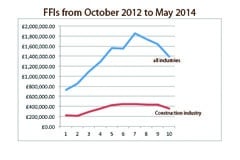HSE Fee for Intervention is effective and should stay, says report
The Health & Safety Executive's Fees for Intervention, which impose a charge of £124-an-hour on companies that contravene health & safety regulations, has proven effective and should stay, an independent report commissioned by the Health & Safety Executive (HSE) has concluded.
Fees for Intervention (FFIs) were introduced in October 2012 – and up to May this year, the latest figures available, had raised £13.7million, 26% of it paid by the construction industry.
The report recognises that inspectors at the HSE have implemented Fees for Intervention consistently and fairly since the scheme started. It found no evidence to suggest that enforcement policy decisions had been influenced in any way by the introduction for FFIs.
The independent panel that conducted the review was chaired by Alan Harding, professor of public policy at Liverpool University. Other participants were representatives of the GMB trade union, the Federation of Small Businesses and the Department for Work & Pensions.
According to the report’s authors, the professional approach adopted by HSE’s inspectors has ensured any challenges raised by the scheme during its first 18 months were minimised. The evidence suggests the concerns voiced about FFI leading to increases in interventions have not manifested themselves to any significant or serious extent and that "generally inspectors and dutyholders continue to work together in improving health and safety management".
Judith Hackitt, Chair of HSE, said: “Both HSE and the Government believe it is right that those who fail to meet their legal health and safety obligations should pay our costs, and acceptance of this principle is growing. This review gives us confidence that FFI is working effectively and should be retained. We will continue to monitor the performance of Fee for Intervention to ensure it remains consistent and fair.”
The report, published by HSE on 6 September along with associated research papers, concludes that “it [FFI] has proven effective in achieving the overarching policy aim of shifting the cost of health and safety regulation from the public purse to those businesses who break health and safety laws”.
It also concludes that: "Fears that FFI would be used to generate revenue have proven to be unfounded.
While not popular with some inspectors and dutyholders, it has been embedded effectively and applied consistently. There is no viable alternative that can achieve the same aims."
The report can be found on HSE’s website: www.hse.gov.uk/fee-for-intervention
Fee for Intervention (FFI) is HSE’s cost recovery regime implemented from 1 October 2012 under regulations 23 to 25 of The Health & Safety (Fees) Regulations 2012. These regulations put a duty on HSE to recover its costs for carrying out its regulatory functions from those found to be in ‘material breach’ of health and safety law.
A material breach is where you have broken a health & safety law and the inspector judges this is serious enough for them to notify you in writing. This will either be a notification of contravention, an improvement or prohibition notice, or a prosecution. Dutyholders who are compliant with the law, or where a breach is not material, are not charged.
The Health & Safety Executive is Britain’s national regulator for workplace health & safety. It aims to reduce death, injury and ill health. It does so through research, information and advice, promoting training, new or revised regulations and codes of practice, and working with local authority partners by inspection, investigation and enforcement.

